|
|
|
|
 |
 |
 |
 |
 |
 |
 |
 |
 |
 |
|
|
Welcome to
the All Children Count
I
ssue of the
BCN Newsl
etter!
|
In this special issue we unite with
Lumos
and
SOS Children's Villages
to highlight recent efforts to close the
large data gaps on children, particularly children living without parental care or outside of households. It is difficult to assess how many children require protection and alternative care, as well as the quality of the care that is provided. Even when indicators and reporting mechanisms are put in place, at the national, regional and international level, the lack of accurate and reliable data challenges the ability of governments and statistical agencies to count all children, and to plan evidence-based prevention and intervention schemes targeted at the individual needs of these children. Notably, this is an issue that affects developed and developing countries alike.
The joint
All Children Count letter
, supported by over 250 organisations, including Better Care Network, and promoted by a campaign spearheaded by SOS Children's Villages and Lumos, calls on states to strengthen their monitoring systems and collect detailed, 'disaggregated', data on children who live outside of households and/or without parental care. 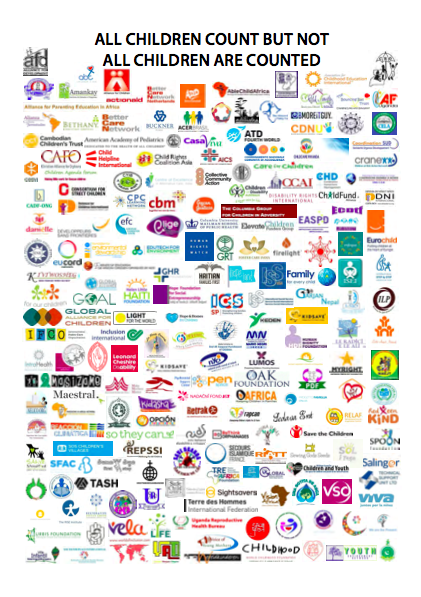 The letter and accompanying campaign aims to make the global framework of Sustainable Development Goals (SDGs) deliver on the promise to leave no one behind and provide equitable development for all, by ensuring this particular group of children is represented in disaggregated data and improving data collection methodologies that will capture these children currently uncounted by existing data collection methods. The letter and accompanying campaign aims to make the global framework of Sustainable Development Goals (SDGs) deliver on the promise to leave no one behind and provide equitable development for all, by ensuring this particular group of children is represented in disaggregated data and improving data collection methodologies that will capture these children currently uncounted by existing data collection methods.
Currently, national census, household-based surveys and administrative data
commonly fail to capture data on children who live outside of households/without parental care. Where children in such living arrangements are represented in data sets, their care status is usually not provided, failing to bring to light the particular disadvantage and vulnerability these children face.
Few countries and regions have reliable data for the most 'captive' group of children - children who are in residential care - despite clear requirements under international law and decades of research showing these children face serious risks to their well being and protection. Strengthening countries' statistical and administrative data systems to make the SDGs work for these children should therefore be a clear priority for all states in their efforts to achieve the SDGs without leaving anyone behind.
Through ongoing efforts with partner organisations, the All Children Count campaign is increasingly putting the issue on the agenda of policy-makers and data experts, using the opportunities offered by the development of national and global frameworks to measure States' progress against the SDG priorities.
Claudia Arisi, Advocacy Advisor, SOS Children's Villages International
Merel Krediet, Advocacy & Campaigns Officer, Lumos
Florence Martin, Director, Better Care Network
|
| FOCUS ON COUNTING CHILDREN OUTSIDE FAMILY CARE |
|
The Focus Section brings together research and other documentation published over the past year or two on a particular theme or region. Its aim is to draw attention to the growing body of knowledge developing on the issue and help busy practitioners keep abreast of learning and changes.
All Children Count
Data collection on the care system: a responsibility of the state laid out in the UN Guidelines
It does not come as a surprise that vital data about children in care is missing and that we need to improve the monitoring of the care system - the
UN Guidelines for the Alternative Care of Children urge governments to
"ensure the development and implementation of coordinated policies regarding formal and informal care for all children who are without parental care. Such policies should be based on sound information and statistical data." The SDGs offer an additional opportunity to remind the UN member states about their duties towards the children we work with, especially because these global goals are triggering a greater commitment from countries' statistical capacity-building in several areas and especially to make visible those groups who are traditionally invisible. Advancements will not always happen overnight, but if we join forces in order to bring change at global, regional and national levels through strong partnerships with like-minded NGOs and other strong advocates of children's care and protection we can take action for better data, for better children's lives.
1. Raising awareness at the 1st UN World Data Forum.
In January 2017, South Africa hosted the first-ever United Nations World Data Forum. More than 1,500 representatives from governments, international organizations, businesses, academia and civil society gathered to discuss challenges and opportunities for harnessing the power of data and monitoring to contribute to the achievement of the 17 Sustainable Development Goals (SDGs). The Forum comes at a crucial time, when 193 governments are mobilising to implement the SDGs for all people and the planet, as part of the global 2030 Agenda for Sustainable Development. The programme covered six main themes, one of which was "Leave no one behind". SOS Children's Villages promoted the All Children Count messages at the plenary session
Counting People to Make People Count
, organised by UNICEF and Development Initiatives.
2. Engaging the UN Statistical Commission
In March, the UN Statistical Commission agreed on a draft resolution for the global SDG Indicators framework that should be adopted later this year. Using that political momentum, Lumos, SOS Children's Villages, the Global Alliance for Children and UNICEF co-organised a side event during the 48th UN Statistical Commission meeting, to discuss the data gap on children living outside of households and/or without parental care. Speakers included the academic and author of the article
'Missing Millions and Measuring Development Progress'
Roy Carr-Hill and H.E. Hang Lina, Director General of the National Institute of Statistics in Cambodia. Around 50 participants joined the discussions, including representatives of governments, statistical bodies, NGOs and UN agencies. The level of interest among participants was very high, with participants particularly keen to demonstrate how citizen collected data and community-based responses could be better used to reach children that are currently missed by conventional statistical methods.
3. Mobilising support of 45 UN Member States
In the week of the the 48th UN Statistical Commission, ATD 4th World and SOS Children's Villages sensitized 45 UN Member States to include in their statement addressed to the UN Statistical Commission the importance of monitoring SDG progress among all children, including children who live outside of households. These Member States form the 'Group of Friends of Children and the SDGs on the Importance of Child-focused Indicators and Data.'
4. Engaging with the UN expert group on SDG indicators
From 28 to 31 March 2017, the UN expert group on SDG indicators held a meeting in Ottawa, Canada, to define a roadmap to strengthen the statistical capacity of countries and UN agencies, so as to enable them to deliver the necessary data and indicators to measure SDG progress at national level. Save the Children read out a statement on behalf of CSOs, including many co-signers of the All Children Count letter, which included a strong call for the need to disaggregate data by care status: The
statement reads
: "On children in care, data disaggregation by care status is needed to ensure that this vulnerable group is represented. We need to expand data collection methodologies which, at present, have a tendency to exclude those children in alternative forms of care."
5. Convening to close the data gap: #ChildrenCount17
From 18-19 July of this year, Comic Relief USA Inc, the Global Alliance for Children, and Lumos convened a two-day meeting to discuss how technology could hold the key to closing the data gap on children outside of families, in parallel to the UN High Level Political Forum on Sustainable Development taking place in New York City. More than 80 representatives of private and public sectors including data and technology experts, government officials, and leaders of businesses, universities and non-governmental organizations worked to identify and propose new solutions to count children living outside families. Alongside this, social media supporters and celebrity ambassadors were invited to add their voice to the conversation in the room, by explaining what being left behind really means through videos, graphics and posters - which were then displayed to event attendees via a live social wall. At the end of the two days, participants committed to an innovative framework for private-public cooperation among the 60 organisations present in the room.
Better Care Network Director Florence Martin delivered a presentation titled
"Counting Children Outside of Family Care: Children in Orphanages and Other Institutions"
at the event, demonstrating the need for comprehensive national data systems. The presentation also highlighted what data is currently available and what kind of data should be collected, barriers to thorough data collection, and examples of strong national-level efforts to collect comprehensive data on children living outside family care.
6. Media coverage
This article from The Guardian newspaper highlights the efforts of the "All Children Count" campaign and describes the situation of the many children around the world who go "uncounted" or who "fall off the radar" due to institutionalization or separation from families, underlining the need for improved data collection.
HuffPost published this article by CEOs of Lumos and Comic Relief USA and Executive Director of Global Alliance for Children, who highlight the convening of leaders at the #ChildrenCount17 conference and
emphasize that achieving the promise of the SDGs to "leave no one behind" will require identifying, counting, listening to, supporting and monitoring
all
vulnerable populations - including the children who live outside the care of a family.
But Not All Children Are Counted
World's leaders have committed to build a sustainable future for all by 2030. But how can we measure progress for children, if many remain virtually invisible in official statistics? This briefing paper by SOS Children's Villages and Development Initiatives
provides a reflection on what can change to achieve a data revolution to transform the care of children outside family care, so they are taken in the picture of SDG progress and receive adequate support to grow up and thrive.
This article from World Development discusses the use of standard household surveys as measurement of progress toward development goals, which by design omit the most marginalized groups from data collection.
This UNICEF publication provides a status report on the availability of child-related SDG indicators, illustrating that ample data is available for only half of child-related indicators. The report also identifies priorities to improve the collection, analysis, and use of data pertinent to children.
This UNICEF press statement accompanies the publication of an article in Child Abuse & Neglect which provides available estimates of the number of children living in formal alternative care at national, regional, and global levels. The statement underlines that these estimates are likely to be "just the tip of the iceberg" and points to the vital need to strengthen countries' capacity to improve national systems for counting, monitoring and reporting on children outside family care - including for children living in private or unregistered institutions.
An international perspective on the undercount of young children in the U.S. Census
The U.S. Census Bureau's Demographic Analysis shows that young children (age 0 to 4) had a higher net undercount rate than any other age group in the 2010 U.S. Decennial Census. This paper identifies key patterns relative to the net undercount of young children in U.S. data and examines data available in other countries to see whether these data patterns exist in other country contexts.
Global-level Efforts to Address the Gaps
The United Nations' 2017 Sustainable Development Goals Report reviews global progress made toward the 17 SDGs over the past year. Page 13 of the report references
children living outside family care and the need for capacity building efforts to achieve more sound disaggregated data for more effective planning, budgeting and policy making on issues concerning vulnerable populations.
This paper from
Global Social Welfare
offers an analysis on orphanhood and living arrangements data based on available Demographic and Health Surveys (DHS) and Multiple Indicator Cluster Surveys (MICS) from 77 countries from sub-Saharan A
frica, Latin America and the Caribbean, North Africa/West Asia/and Europe, Central Asia, and South and Southeast Asia.
This essay published in
Global Social Welfare describes the efforts to measure children's care arrangements in Southeast Asia and sub-Saharan Africa, draws connections between children's care environments and their developmental outcomes, and discusses the strengths and limitations of current international efforts to measure children's care.
Produced by ICF International with support from USAID's DHS Program, this report uses data from 80 DHS surveys and 55 MICS surveys, conducted between 2000 and 2014 in 70 different countries, to estimate child vulnerability, based on the prevalence of four identified components of vulnerability and combinations of said components: (1) the child has lost one or both parents; (2) the child is not living with either parent; (3) the child lives in a household in which no adult has any formal education; and (4) the child's household is in the bottom two wealth quintiles.
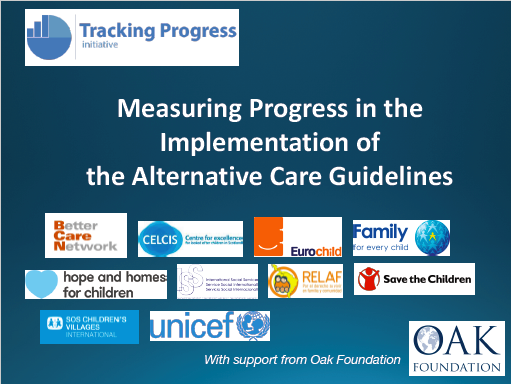 This document is an adapted presentation created
by Better Care Network and Save the Children UK describing the
Tracking Progress Tool. Tracking Progress is an interactive diagnostic and learning tool developed by an inter-agency group to
support national level actors to measure their progress on implementing the Alternative Care Guidelines.
Revised through field testing in
Rwanda
,
Romania
, and
Paraguay
, the tool is being finalized for u
se in five pilot countries. This document is an adapted presentation created
by Better Care Network and Save the Children UK describing the
Tracking Progress Tool. Tracking Progress is an interactive diagnostic and learning tool developed by an inter-agency group to
support national level actors to measure their progress on implementing the Alternative Care Guidelines.
Revised through field testing in
Rwanda
,
Romania
, and
Paraguay
, the tool is being finalized for u
se in five pilot countries.
Country-level Efforts to Address the Gaps
Recent efforts to count and estimate the number of children living in residential care facilities in the country have resulted in quite different numbers.
This report describes the efforts of the Cambodian Ministry of Social Affairs, Veterans and Youth Rehabilitation
, supported by UNICEF
and USAID
, to identify the number of residential care facilities in Cambodia, as well as the number of children cared for within the residential care facilities. This report identifies a total of 16,579 children under age 18 living in 406 residential care institutions in Cambodia.
This report shares the methodology and findings from a national measurement exercise facilitated by Cambodia National Institute of Statistics, with technical support from Columbia University,
Moulathan Consulting and a technical working group,
in an effort to estimate the number of children living in residential care institutions in Cambodia. This report estimates a total of 48,775 children under age 18 to be living in 1,658 residential care institutions in Cambodia.
This executive summary describes the key findings from a study mapping the residential and institutional care facilities in Greece. The study, facilitated by Roots Research Center with support from Vodafone, Hope and Homes for Children UK and Eurochild, identifies the number of children living in residential and institutional care, as well as demographic information about the children, and compares to data on children living in foster care arrangements.
Malawi:
This report describes the activities of a study commissioned by the Malawi Ministry of Gender, Children, and Community Development to investigate
the situation of children in institutional care. Conducted by the Centre of Social Research at the University of Malawi with support from UNICEF Malawi and Better Care Network,
the study sought to create
a database containing all institutions in Malawi
catering for children requiring alternative care.
This report
shares the methodology, findings, and recommendations from a study conducted by
Malawi Ministry of Gender, Children, Disability, and Social Welfare, Retrak, and Chisomo Children's Club
addressing the data gaps on children living and working on the streets in Malawi. A webinar discussing these efforts is available
here.
In this report, the NSPCC compiles and analyzes the most up-to-date child protection data that exists across the UK for 2017, measuring the progress of 20 indicators over time in each of the four countries to determine the safety of children in the UK.
This statistical first release from the UK Department for Education provides data specifically on secure children's homes in England and Wales, including the number of children accommodated, characteristics of accommodated children, the number and types of placements, length of stay in care, and trends in care placements over time.
This analysis was produced as part of an independent review into children's residential care in England for the UK Department for Education and presents data on children living in all types of residential care facilities as of 31 March 2015.
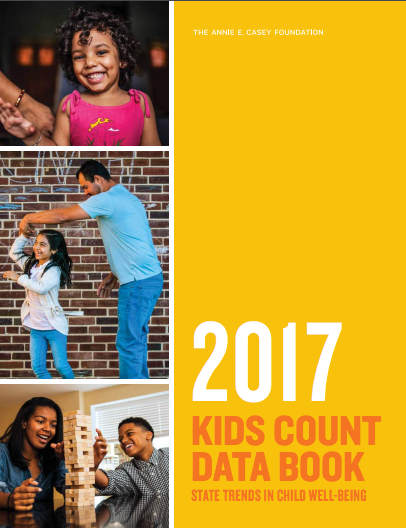 Each year, the Each year, the Annie E. Casey Foundation
produces an annual
KIDS COUNT
data book reporting on the status of children and families for each state in the U.S. The report highlights state and national trends and offers key examples of investments and interventions attaining better outcomes for children.
This policy report from the Annie E. Casey Foundation utilizes data on children in the U.S. child welfare system to highlight the benefits of family-based care for children, expressing the need to prioritize family-based care settings for all children in the child welfare system in the United States.
Transformative Monitoring for Enhanced Equity (TransMonEE)
Each year, TransMonEE, established by the
UNICEF Innocenti Research Centre, captures social and economic data relevant to the situation and wellbeing of children, young people and women in countries within
Eastern Europe and
Central Asia. The database
includes data on children in alternative care for Eastern and Central Europe and Central Asia, as well as data on child protection, social protection, and other topics.
This report summarizes the content of the 6-7 October 2016 Network Meeting of National Statistical Offices, an event focused on enhancing the quality of national data on key indicators of child well-being in Eastern Europe and Central Asia, with emphasis on children in alternative care.
Country Briefs
This series of country briefs, written by Garazi Zulaika and Florence Martin, aim to provide an analysis of children's living and care arrangements according to the latest available data from
Demographic and Health Surveys (DHS) or
Multiple Indicators Cluster Surveys (MICS) in each respective country at the time of publication.
Click below to read the Country Briefs from the following countries:
|
|
Understanding the Situation
|
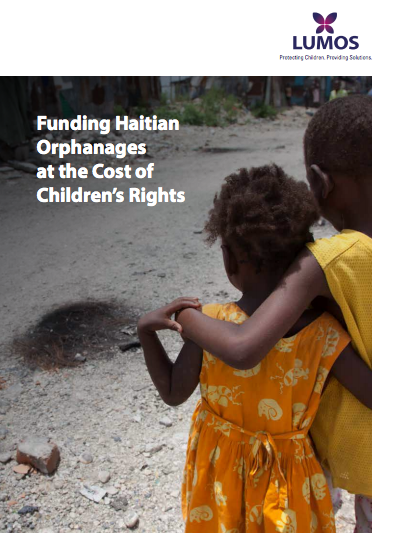 Funding Haitian Orphanages at the Cost of Children's Rights Funding Haitian Orphanages at the Cost of Children's Rights
Lumos documented at least $70 million per year provided by international private donors to just over one-third of Haiti's 750 orphanages.
Most donors support orphanages with the best intentions to help children in need. Yet, many children in Haitian orphanages have suffered violence, exploitation, abuse, and neglect. This report is also available in French.
Residential Child and Youth Care in a Developing World: European Perspectives
This book is compiled of contributions from local practitioners, educators and researchers throughout Europe on residential child and youth care traditions, policies, and practices in their respective countries.
Building the Future: Children and the Sustainable Development Goals in Rich Countries
The UNICEF Innocenti Report Card provides an assessment of child well-being in the context of the Sustainable Development Goals (SDGs) in 41 high- and middle-income countries. The report identifies children outside family care as a particularly vulnerable group, often falling outside reported national averages.
Subjective Well-Being of Children in Residential Care
This chapter of Psychosocial Well-being of Children and Adolescents in Latin America discusses residential care in Brazil and the current research on child well-being for children in southern Brazil.
Exploring Challenges of Adolescent Females in Child-headed Households in South Africa
This systematic review from the Journal of Human Ecology draws from previous research to provide a broad picture of the challenges of adolescent females in child-headed households in South Africa.
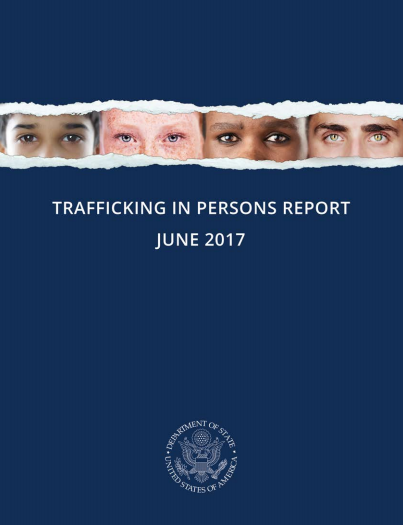
Trafficking in Persons Report 2017
The U.S. Department of State annual Trafficking in Persons Report provides of snapshot of human trafficking around the world with attention to key issues, trends, standards, and updates. In the 2017 report, children living in residential care in several countries were reported to be particularly vulnerable to trafficking. Most notably, for the first time in history, the report recognizes the recruitment of children into children's homes under false pretenses in Nepal as a form of child trafficking.
Assessing Health and Other Conditions among Orphans Living with Extended Families
This article from the Journal of Human Ecology describes a study exploring the health challenges faced by orphans living with extended families in South Africa and highlights opportunities for successful interventions for orphaned children in kinship care.
The relative safety of paternal, maternal, and traditional foster care placements
This article published in Child Abuse & Neglect describes a research study investigating child safety between biological and non-biological kinship care placements and traditional unrelated foster care placements in the United States.
"This girl is still MISSING!! She is NOT a runaway!": A critical review of factors that contribute to increased risk and vulnerability for children from out-of-home care who may go missing
This article appearing in the Children and Youth Services Review discusses the factors contributing to risk and vulnerability in out-of-home care in Australia and how they are associated with the phenomena of young people and children in care going missing.
Signs of reactive attachment disorder and disinhibited social engagement disorder at age 12 years: Effects of institutional care history and high-quality foster care
This study published in Development and Psychopathology examines signs of reactive attachment disorder and disinhibited social engagement disorder at age 12 years in children abandoned shortly after birth and randomized to institutional care or high-quality foster care.
|
UN CRC General Comment No. 21 (2017) on children in street situations
Issued by the Committee on the Rights of the Child, Gen. Comment 21 provides guidance to States on developing comprehensive, long-term national strategies on children in street situations, utilizing a child rights approach and addressing both prevention and response in line with the Convention on the Rights of the Child.
Global Advocacy Toolkit for the Social Service Workforce
This
research-based, solutions-focused toolkit from the Global Social Service Workforce Alliance provides advocates with a common set of tools and messages with which to bring about greater political and programmatic priority for strengthening the social service workforce.
State of the World's Fathers 2017: Time for Action
MenCare's second State of the World's Fathers report provides a global analysis of fatherhood and caregiving, proposing the widespread need to equalize care responsibilities for both men and women around the world.
In this briefing, the Global Initiative to End All Corporal Punishment of Children tracks progress toward the universal prohibition of corporal punishment in Africa and calls on African governments to fulfill their obligation to protect children by ending corporal punishment in their respective countries.
The Code voluntourism policy: Does your business include voluntourism products or orphanages in tourism programs?
This policy describes the child protection issues connected to voluntourism and orphanages, and states the criteria by which organisations involved in voluntourism activities may apply to join The Code.
|
 "Let me be me!" Better Care for LGBTI* Children: A Working Paper for iNGOs "Let me be me!" Better Care for LGBTI* Children: A Working Paper for iNGOs
This working paper, produced by Dreilinden with support from SOS Children's Villages and Keeping Children Safe, compiles research and tools, interviews, and practice examples
to improve practice for those working with LGBTI* children in care.
"We are merchandise on a conveyer belt": How young adults in the public child protection system perceive their participation in decisions about their care
Based on semi-structured, in-depth interviews with eight young adults in the public child protection system in one northeastern state in the United States, this study from the Children and Youth Services Review illustrates how young people feel about their experiences of participation and decision-making within the US care system.
Straightjackets and Seclusion: an investigation into abuse and neglect of children and adults with disabilities in Hungary
This report by the Mental Disability Advocacy Centre (MDAC) contains information collected at Topház residential institution for children and adults with disabilities in
Hungary.
The findings indicate serious abuse and neglect of adults and children with intellectual, cognitive, developmental, multiple and profound disabilities who are living there.
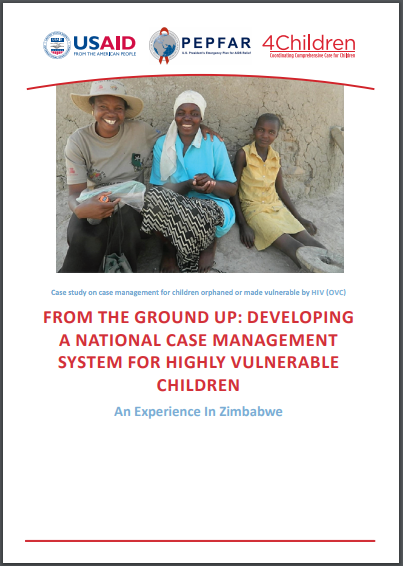
From the ground up: Developing a national case management system for highly vulnerable children - An experience in Zimbabwe
This 4Children case study published by Catholic Relief Services describes the adaptation of a community-based case management model to a national case management framework for highly vulnerable children in Zimbabwe.
Changing mind-sets and Pioneering family social work in Tajikistan: An evaluation of a pilot fostering project and its relation to wider family support services
This report by Dr. Ian Milligan at CELCIS provides an evaluation of the Keeping and Finding Families Project, a pilot foster care project in Tajikistan.
Privatization and subsidization of adoption services from foster care: Empirical evidence
This paper published in the
Children and Youth Services Review analyzes the findings from a cross-sectional investigation on the differences in adoption services between public and private agencies throughout the
United States.
|
Nigeria's Street Children 'Almajiri' face a life of poverty and violence
Street children in Nigeria face risks of being recruited by terrorist organizations. This program held by American University of Nigeria hopes to reduce children's risks of recruitment.
An education to help Nigeria's street children
|
2017 PSS Forum: Equity, Equality for all Girls, Boys and Youth
4-6 Sep 2017 - Arusha, Tanzania

18 Sep 2017 - Rio, Brazil
1-4 Oct 2017 - The Hague, Netherlands
|
| JOB POSTINGS, CONSULTANCY OPPORTUNITIES & CALLS FOR NOMINATIONS |
ChildFund International seeks Senior Advisor, Child Protection in Emergencies
Washington, D.C., U.S.
Palladium seeks Team Leader: Access to Justice and Violence against Women & Children support Malawi
Deadline 16 Aug 2017 - Lilongwe, Malawi
Save the Children seeks Zambia Rising Project Consultant: Finalization of the National Implementation Plan for Social Service Workforce Strengthening
Deadline 26 July 2017 - Desk-based, with travel to and throughout Zambia
Global Social Service Workforce Alliance seeks Senior Technical Advisor, Social Service Workforce Strengthening
Washington, D.C., U.S.
Catholic Relief Services seeks Program Manager II, Case Management Rapid Response, Uganda
Kampala, Uganda
Catholic Relief Services seeks Child Protection and Alternative Care Senior Technical Advisor
Baltimore, Maryland, U.S.
Catholic Relief Services seeks Technical Advisor I, 4Children
Baltimore, Maryland, U.S.
Catholic Relief Services seeks Project Director, 4Children Cambodia
Phnom Penh, Cambodia
|
|
|
|
 |
 |
 |
 |
 |
 |
 |
 |
 |
 |
|
| |
|
|